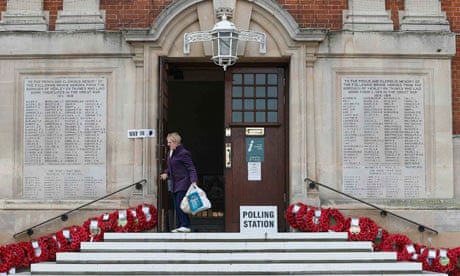Turnout in the elections for police and crime commissioners was heading for a record low for a national election, possibly as low as 15%, raising questions about the authority and legitimacy of the new breed of politicians responsible for overseeing police chief constables in England and Wales.
The bulk of the election results in the 41 constabulary areas will emerge on Friday afternoon, apart from Wiltshire which was counting overnight.
One Labour source described the turn-out as "dreadful, very slow, very low". A Liberal Democrat official predicted turnout might not exceed 10% to 15%, although this could be supplemented by postal votes which could push the total figure closer to 20%.
The Lib Dem source said polling stations were reporting turnout as low as 5%-7% by the middle of the afternoon on Thursday, a point at which nearly half those who intended to vote would have been expected to have turned up.
Such a low turnout, all parties have admitted, may produce quirky results with independent candidates and Ukip possibly doing well.
The record for a low turnout in a parliamentary byelection was 19.9% in 1999 in Leeds Central. In European parliamentary elections the lowest turnout was 24% in 1999 and in local elections turnout fell in 1998 to 25.2% in metropolitan councils. Overall turnout was 28% in England in 1998, but that included London which has much higher local election turnouts.
It is generally thought that elections held in November, as opposed to the spring, reduce turnouts by up to 6%.
There were reports from the Lib Dems that the former deputy prime minister Lord Prescott's bid to become crime commissioner for Humberside was going to be tight. They claimed his vote in Hull, his stronghold, might not have turned out in sufficient numbers to balance the rural Conservative vote.
Labour is hoping to prove its ability to win seats in the south by strong showings in Kent and East Midlands.
The Lib Dems do not expect to win a single commissioner post and were only standing in half the contests, largely owing to party opposition to the new posts.
Such a disastrous turnout will inevitably put pressure on David Cameron as some are likely to question the mandate of a commissioner elected on a such a low vote. The Conservativeswere already preparing to argue that, even if the elections had not gripped the public imagination, the new commissioners would over time develop a bigger profile than the current police authorities.
They also insisted that the commissioners would come to be accepted and prove to be a new force on the British democratic landscape.
There was an inquest in Downing Street over whether Cameron did everything he could to boost turnout after refusing to fund a mailshot to every home.
Police forces, largely opposed to the commissioners, may feel emboldened to take a tougher line with them in the wake of the low turnout .
Labour was focusing its efforts and resources on ensuring it wins the Corby and East Northamptonshire byelection. Corby is seen as a key swing constituency that is likely to be vital to the party's chances of winning the 2015 general election. Labour based its campaign on the state of the economy and popular anger with the former Tory MP Louise Mensch for resigning from the seat to go and live with her family in New York. The high-profile Mensch quit to be with her husband, a rock promoter in the US.
Labour was describing itself as cautious, but most observers think it will win the seat comfortably on a turnout of just under 50%. Labour held the seat until the last election but it was won by the Tories in 2010 with a slim majority of just under 2,000. Through the past two decades the constituency has shifted between the two main parties, but mainly on relatively small swings.
It is divided between the mainly Labour-supporting town of Corby itself, and outlying villages in which the Conservative vote is housed.
The Lib Dems admit their vote has been badly squeezed. In what is going to be another miserable electoral episode for Nick Clegg, his party will be battling to save its deposit and avoid falling to fourth place behind Ukip.
The result is expected at around lunchtime on Friday.
Labour also had a serious operation under way to get out the vote in an attempt to win the new mayoralty of Bristol, where it is facing a challenge from a former Lib Dem businessman who is standing as an independent.

Comments (…)
Sign in or create your Guardian account to join the discussion